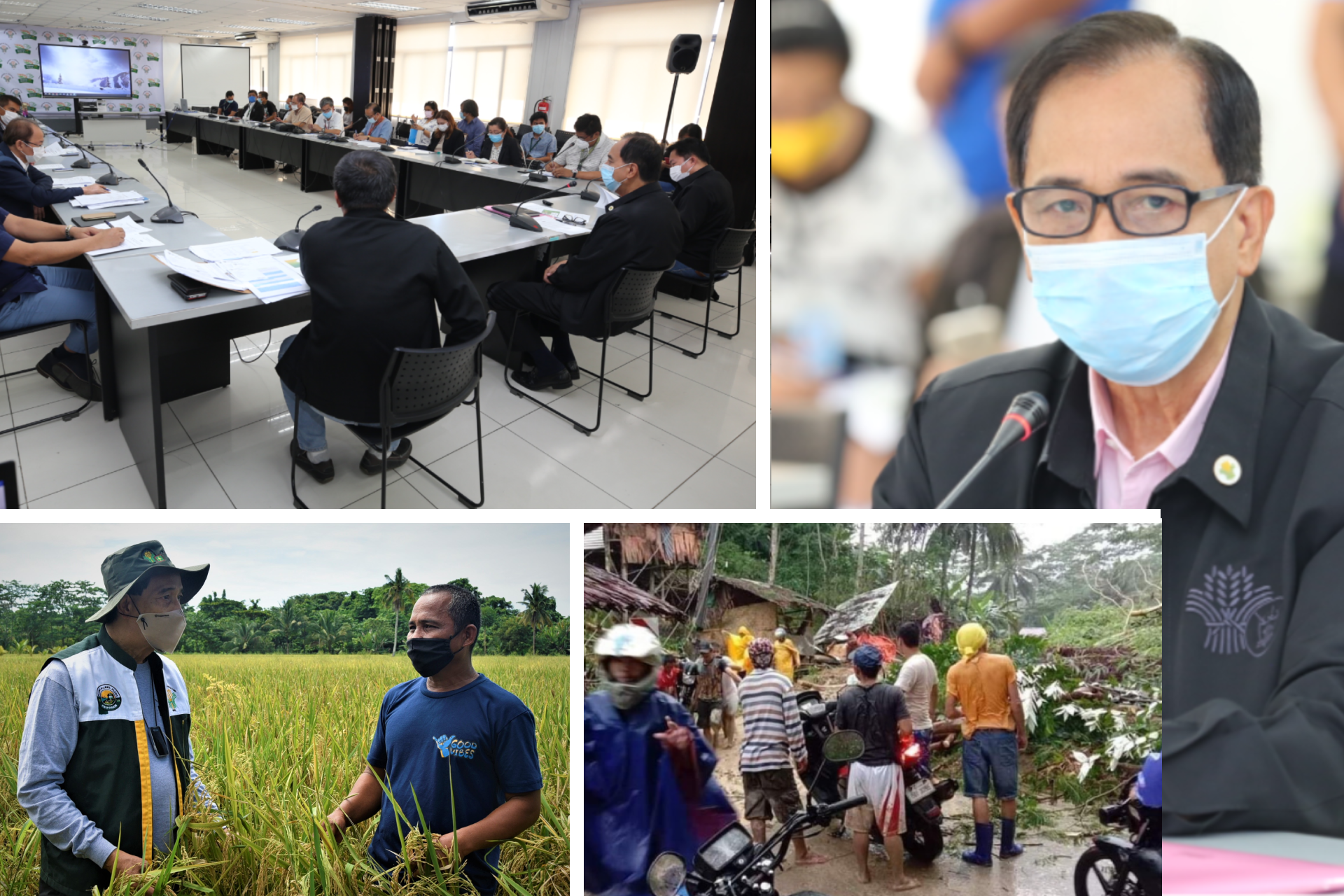
Agriculture Secretary William Dar wants the Department of Agriculture (DA) to focus on four central measures to guide policy decisions and programs next year.
In Department Memorandum Order issued on December 28, 2021, Dar enumerated these four measures as: effective fund utilization; proactive planning and implementation; publication of operations manuals for all units; and institutionalization of the food systems approach advocated by the United Nations.
“We have done much to ensure our national food security in these difficult times,” Dar said. “However, the global Covid-19 pandemic continues to limit any semblance of normalcy for people already fed up with quarantine lockdowns and mobility restrictions. In agriculture, the African Swine Fever (ASF), the series of calamities, and the global hike in prices of inputs (corn, soybeans, fertilizer, petroleum, etc.) have aggravated the situation…Our job is far from over,” he added.
The agriculture chief directed all DA attached agencies, staff bureaus, and regional offices to realign unutilized 2021 funds towards priority focus areas, as well as in the rehabilitation and recovery efforts for Typhoon Odette-affected regions.
Another key measure that DA will implement for the coming year is the utilization of its 2022 government appropriation to ensure maximum agriculture growth.
“Implement the integrated regional workplans we have agreed during our ManCom and operationalize the different commodity industry and investment roadmaps that we have developed with the concerned stakeholders. These workplans and roadmaps should guide our various interventions towards our strategic goals,” Dar said in his memo.
Partners such as farmer cooperatives and associations, industry associations, as well as state universities and colleges will also be tapped for various DA projects.
“Let us also tap the expertise of partners to support the implementation of our programs,” Dar said.
He told DA officials and staff members to review the current budget allocation and support the 18 key strategies espoused in the OneDA reform agenda.
“Let’s increase our investments in the more transformative interventions that will help consolidate, modernize, industrialize, and professionalize Philippine agriculture,” he said in his memo.
The DA executives and staff members are also directed to work on building up technical and managerial skills to take in additional responsibilities. The OneDA reform agenda advocates professionalization of DA employees.
The task of monitoring and evaluating how each unit measures up to the OneDA agenda was given to the Policy and Planning Division of the department, which will craft the OneDA Reform Agenda operations manual. “All actions will be monitored for service productivity and continuity,” Dar said.
The agriculture secretary also emphasized the importance of the food systems approach as an integral part of the strategic plan under the OneDA reform agenda.
“The goal is to achieve a more sustainable and inclusive food system, considering various aspects that contribute to the efficiency of each system, leaving no stone unturned – for a more sustainable and fair value chain,” Dar said.
The DA chief also identified several “burning” issues that the department must address by next year:
- Sustain joint efforts to contain, manage, and control African Swine Fever (ASF), and intensify hog repopulation program in partnership with the local government units (LGUs), commercial and clustered backyard swine raisers, Land Bank of the Philippines, Development Bank of the Philippines, and other hog industry stakeholders. Let’s not fail to meet our hog repopulation target for 2022;
- Ramp up assistance to victims of Typhoon Odette and assist in the rehabilitation of recovery of damaged agri-fishery communities, infrastructure, and facilities. Let’s double our efforts to support recovery in the coconut, fisheries, sugarcane, and rice areas;
- Assist the Philippine Coconut Authority (PCA), concerned OneDA family agencies, and other designated agencies in the efficient implementation of the Coconut Farmers and Industry Development Plan (CFIDP), and ensure proper utilization of the coconut levy fund;
- Address rising prices of fertilizers by promoting widescale adoption of balanced fertilization and efficient use of inorganic fertilizers through integrated nutrient management practices for different crops (i.e., rice, vegetables, fruits, etc.). Intensify support for soil testing and consider other growth-enhancing inputs such as biologics (biofertilizers, foliar, stimulant). Continue assisting the private sector to source out fertilizer supply from other countries through bilateral arrangements;
- Assist in addressing rising prices of food commodities. The RFOs (including NCR operations), NFA, AMAS, Bantay Presyo, and FOS must work together to monitor supply and prices and ensure smooth flow of food supply within the regions and to the food deficit areas (urban areas); and
- Ensure the completion of legislated fishery hatcheries and promote other aquaculture and marine resources development. Aquaculture is a growth sector with very high local and export market potential that must be supported with high priority.
At least P2.9-billion-worth of readily-available assistance will be extended to farmers and fisherfolk affected by the recent Typhoon Odette. These interventions include:
- P1-B of Quick Response Fund for the rehabilitation of affected areas charged to 2022 budget;
- P828-M from the Philippine Crop Insurance Corporation to indemnify affected farmers;
- P500-M under the Survival and Recovery Assistance Program of the Agricultural Credit Policy Council for 20,000 farmers and fisherfolk at P25,000 each;
- P314-M worth of rice seeds, P129-M worth of corn seeds, P57-M worth of assorted vegetables from 2021 and 2022 budgets;
- P47-M worth of assistance to affected fisherfolk from Bureau of Fisheries and Aquatic Resources;
- P625,150 worth of drugs and biologics for livestock and poultry; and
- Mobilization of funds from Philippine Coconut Authority 2022 GAA, Coconut Farmers, and Industry Development Plan funding, Sugar Regulatory Administration 2022 GAA, and the 2022 GAA for RFOs 4B, 6, 7, 8, 9, 10, 13.
“The OneDA reform agenda should be our legacy to the incoming officials of the Department. This should serve as a guide and provide a working continuity program so that there will be no or minimal disruption and keep the Department safe and operational at all times,” Dar concluded. ### (DA StratComms)














